.
Four pelicans went over the house,
Sculled their worn oars over the courtyard: I saw that ungainliness
Magnifies the idea of strength.
A lifting gale of sea-gulls followed them; slim yachts of the element,
Natural growths of the sky, no wonder
Light wings to leave the sea; but those grave weights toil, and are powerful,
And the wings torn with old storms remember
The cone that the oldest redwood dropped from, the tilting of continents,
The dinosaur’s day, the lift of new sea-lines.
The omnisecular spirit keeps the old with the new also.
Nothing at all has suffered erasure.
There is life not of our time. He calls ungainly bodies
As beautiful as the grace of horses.
He is weary of nothing; he watches air-planes; he watches pelicans.
Sculled their worn oars over the courtyard: I saw that ungainliness
Magnifies the idea of strength.
A lifting gale of sea-gulls followed them; slim yachts of the element,
Natural growths of the sky, no wonder
Light wings to leave the sea; but those grave weights toil, and are powerful,
And the wings torn with old storms remember
The cone that the oldest redwood dropped from, the tilting of continents,
The dinosaur’s day, the lift of new sea-lines.
The omnisecular spirit keeps the old with the new also.
Nothing at all has suffered erasure.
There is life not of our time. He calls ungainly bodies
As beautiful as the grace of horses.
He is weary of nothing; he watches air-planes; he watches pelicans.
Robinson Jeffers (1887-1962): Pelicans, November 1925, from American Poetry: A Miscellany, ed. Lewis Untermeyer, 1927
Pelican in a dive: photo by Coveredinsevindust, 23 March 2013
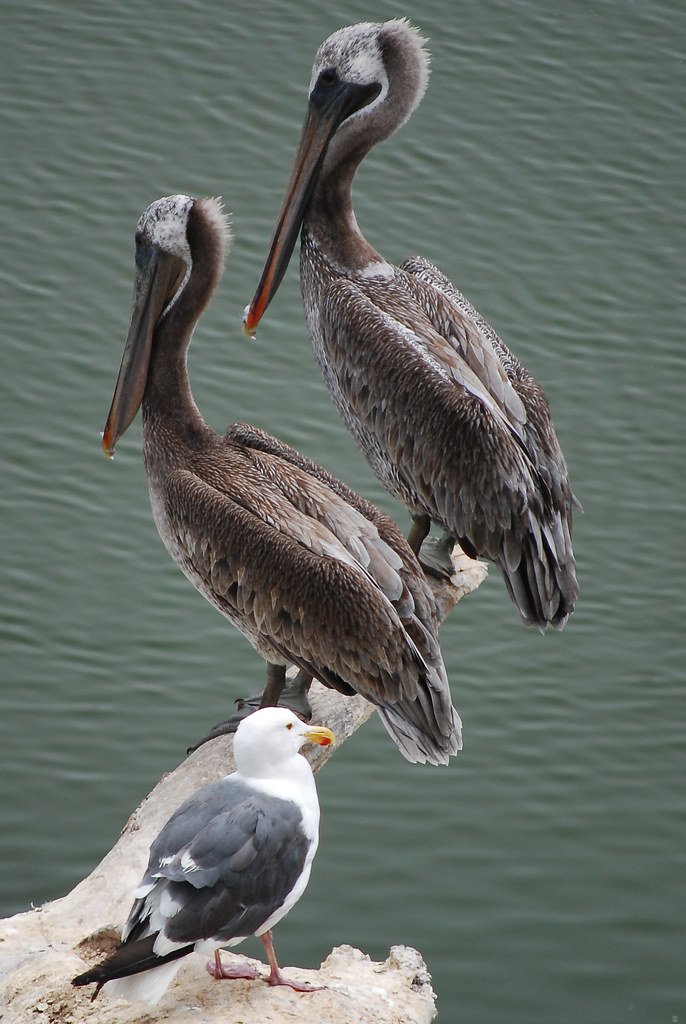
Brown Pelicans and seagull, UCSB Lagoon, Goleta, California: photo by Steve Voght, 16 August 2009
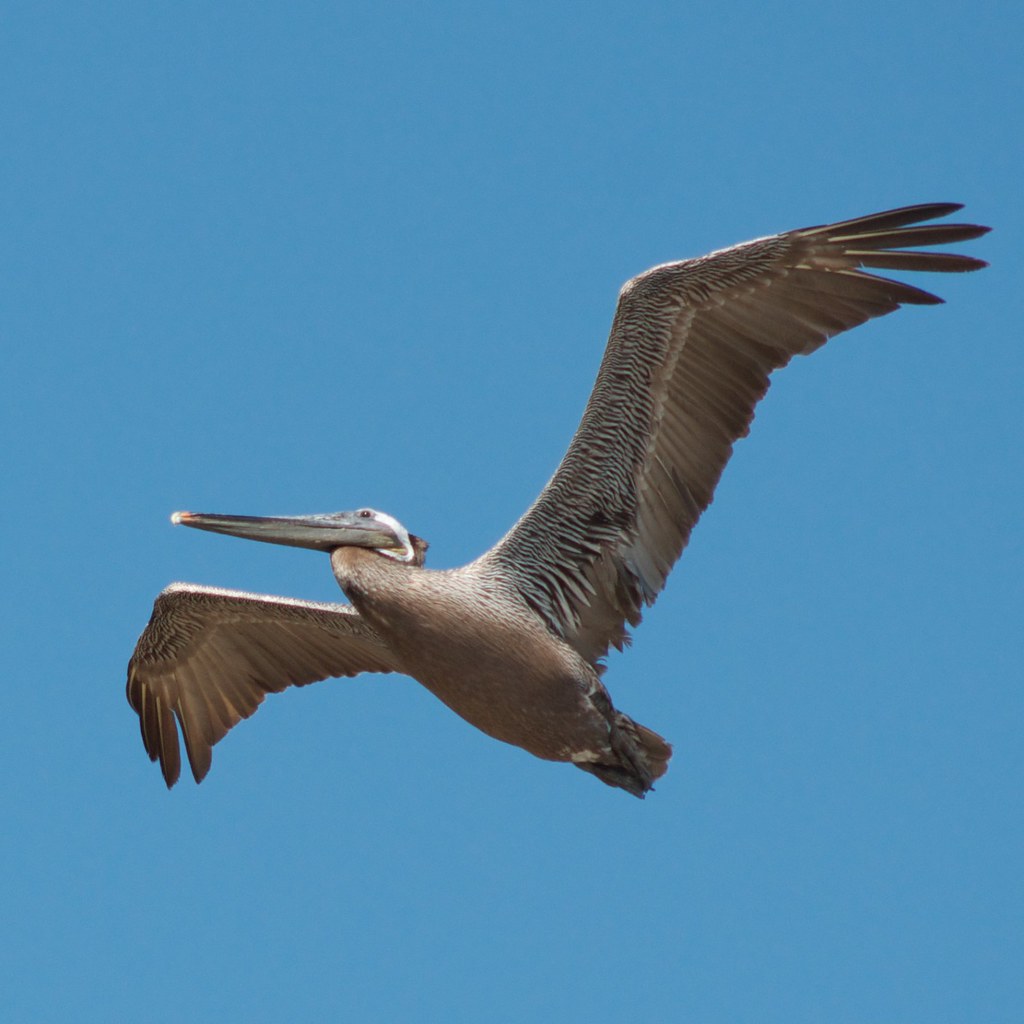
Brown Pelican, Goleta, California: photo by Jon Sullivan, 28 July 2013

Brown Pelicans in flight, Goleta, California: photo by Jon Sullivan, 28 July 2013
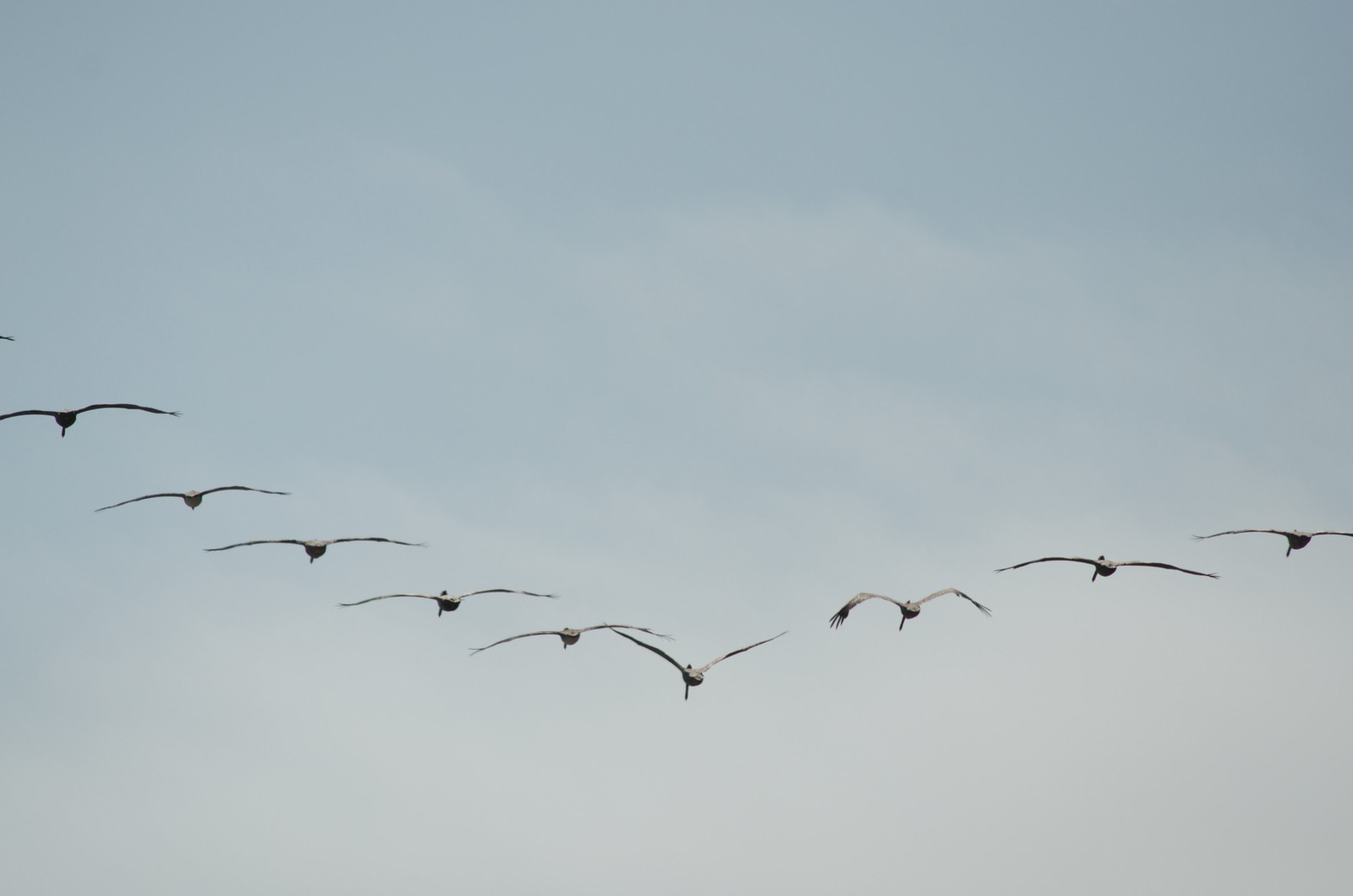
Pelicans in flight, Goleta, California: photo by Jon Sullivan, 28 July 2013
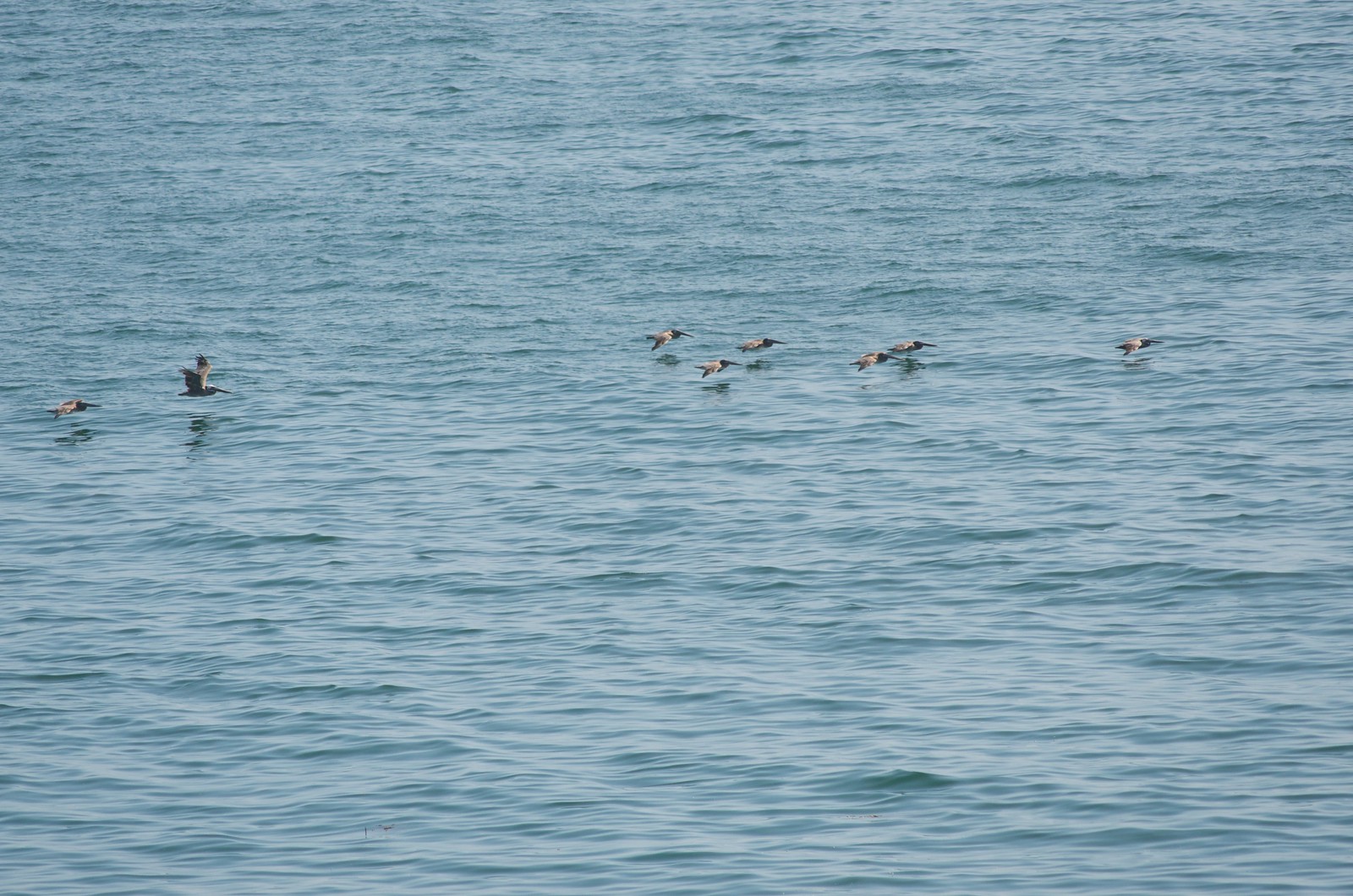
Pelicans skimming, Goleta, California: photo by Jon Sullivan, 28 July 2013

Petroleum pipeline signals future development off Mulholland Drive in the Santa Monica Mountains on the western edge of Los Angeles. The mountains contain the last semi-wilderness in Los Angeles County. Some 84 percent of the state's residents live within 30 miles of the coast, and this concentration has resulted in increased land use pressure. Of the 1,072 mile of mainland shoreline (excluding San Francisco Bay), 61 percent is privately owned: photo by Charles O'Rear (1941-), May 1975, from the DOCUMERICA series, an Environmental Protection Agency program to photographically document subjects of environmental concern, compiled 1972-1977 (U.S. National Archives)

Oil covers rocks near Refugio state beach on Friday: photo by Justin Sullivan via the Guardian, 22 May 2015

A bird covered in oil spreads its wings as it sits on a rock near Refugio state beach on Friday: photo by Justin Sullivan via the Guardian, 22 May 2015
A bird covered in oil spreads its wings as it sits on a rock near Refugio State Beach in Goleta: photo by Justin Sullivan via Los Angeles Times, 21 May 2015
"Get oil out!
Workers
at the Los Angeles Oiled Bird Care and Education Center work to clean
an oil-covered pelican rescued from the spill at Refugio State Beach: photo by Irfan Khan via Los Angeles Times, 21 May 2015
Lesson of Santa Barbara oil spill: Leave petroleum in the ground: David Helvarg, Los Angeles Times, 22 May 2015
Memorial
Day marks the beginning of high beach season, but there are miles of
coastline near Santa Barbara that will be out of commission this weekend
thanks to a pipeline oil spill.
This is how most offshore oil
works: You drill miles off the coast, pump the oil onshore to be
processed and pipe it along the coast. On Tuesday, an underground
pipeline that runs between Gaviota and Refugio State Beach ruptured, and
the oil followed gravity into a culvert and back out to sea.
More
than 100,000 gallons of oil may have spilled, including an estimated
20,000 on the beach and in an oil slick in one of our nation's richest
marine habitats. The pipeline company has apologized for the
“inconvenience” all this will cause. What's particularly troubling is
that compared with drilling rigs, pipelines are supposed to be the safe
part of offshore oil operations.
California
was the site of the world's first offshore drilling, from piers in
Summerland in the late 19th century. By 1901, the San Jose Mercury News
reported, “The whole face of the townsite is aslime with oil leakages,”
and Santa Barbara banned oil piers. It took the federal government more
than 60 years to convince the locals that drilling technology had
advanced enough that spills would be a thing of the past. Then, in 1969,
a Union Oil rig experienced a blowout and more than 3 million gallons
of oil coated 35 miles of Santa Barbara County beaches six inches thick.
Seabirds, fish and mammals died in droves.
The sight of dying,
oil-covered birds in the same year that the polluted Cuyahoga River
caught fire in Cleveland gave birth to the modern environmental
movement. When President Nixon made an appearance in Santa Barbara, he
was met by thousands of angry residents and the rallying cry “Get oil
out!”
A pelican covered in oil sits on a beach about a mile west of Refugio State Beach on Wednesday, May 20: photo by Kenneth Song / Associated Press via Los Angeles Times, 20 May 2015
As
the cleanup continues this week at Refugio State Beach, President Obama
should make his own pilgrimage to the West Coast to check out the
results of offshore drilling. He seems to have learned little from the
BP blowout five years ago in the Gulf of Mexico. That disaster killed 11
workers and spilled 500 million gallons of oil, the result of gross
negligence on the part of BP, according to a federal court ruling. The
BP spill is still rippling through the gulf. On Wednesday, a new study
reported that hundreds of bottlenose dolphins continue to die every year
as a result of the spill.
Despite the steep costs of BP's
negligence, the Obama administration proposes to open up new drilling
sites along much of the Atlantic seaboard, and in the remote Arctic
Ocean off Alaska, beginning in 2017.
Last
week, in the largest citizen lobby for ocean conservation in U.S.
history, nonpartisan delegations from 24 states held 163 meetings on
Capitol Hill to oppose any new offshore drilling, among other issues.
Along the Eastern Seaboard, more than 60 towns and cities, under
Democratic and Republican leadership, have passed resolutions against
oil surveys and drilling that might threaten their coastal economies and
way of life.
On
May 16 in Seattle, hundreds of protesters in kayaks surrounded Shell
Oil's Arctic exploratory rig, the Polar Pioneer, hoping to keep it away
from Alaska's Chukchi Sea during the brief upcoming Arctic summer. Coast
Guard Commandant Paul Zukunft has pulled no punches about the risks of
drilling and shipping in the Arctic, warning of a “black swan” incident --
a disaster of historic proportion -- if something like a major oil spill
were to occur, because there would be no way to effectively respond to
it.
On Wednesday, President Obama told the graduating class at
the Coast Guard Academy in New London, Conn., that the science on
climate change is clear and U.S. national security is threatened by
global warming. What he didn't mention was the rest of the science, the
part that indicates that leaving petroleum reserves in the ground -- and
under the sea bed -- is the best way to avoid the most catastrophic
effects of climate change.
The
1969 oil spill in Santa Barbara galvanized a movement and effectively
ended additional drilling leases off California's coast. The 2015 spill
is a reminder that the work of that movement is far from finished. The
dangerous prospect of offshore leases will be a factor in the
presidential primaries on the East Coast. The protests against dangerous
drilling for Arctic oil will continue. It's past time to “Get oil out.”
David
Helvarg is executive director of Blue Frontier, an ocean conservation
and policy group. His latest book is "Saved by the Sea — Hope,
Heartbreak and Wonder in the Blue World".
Workers
at the Los Angeles Oiled Bird Care and Education Center work to clean
an oil-covered pelican rescued from the spill at Refugio State Beach: photo by Irfan Khan via Los Angeles Times, 21 May 2015
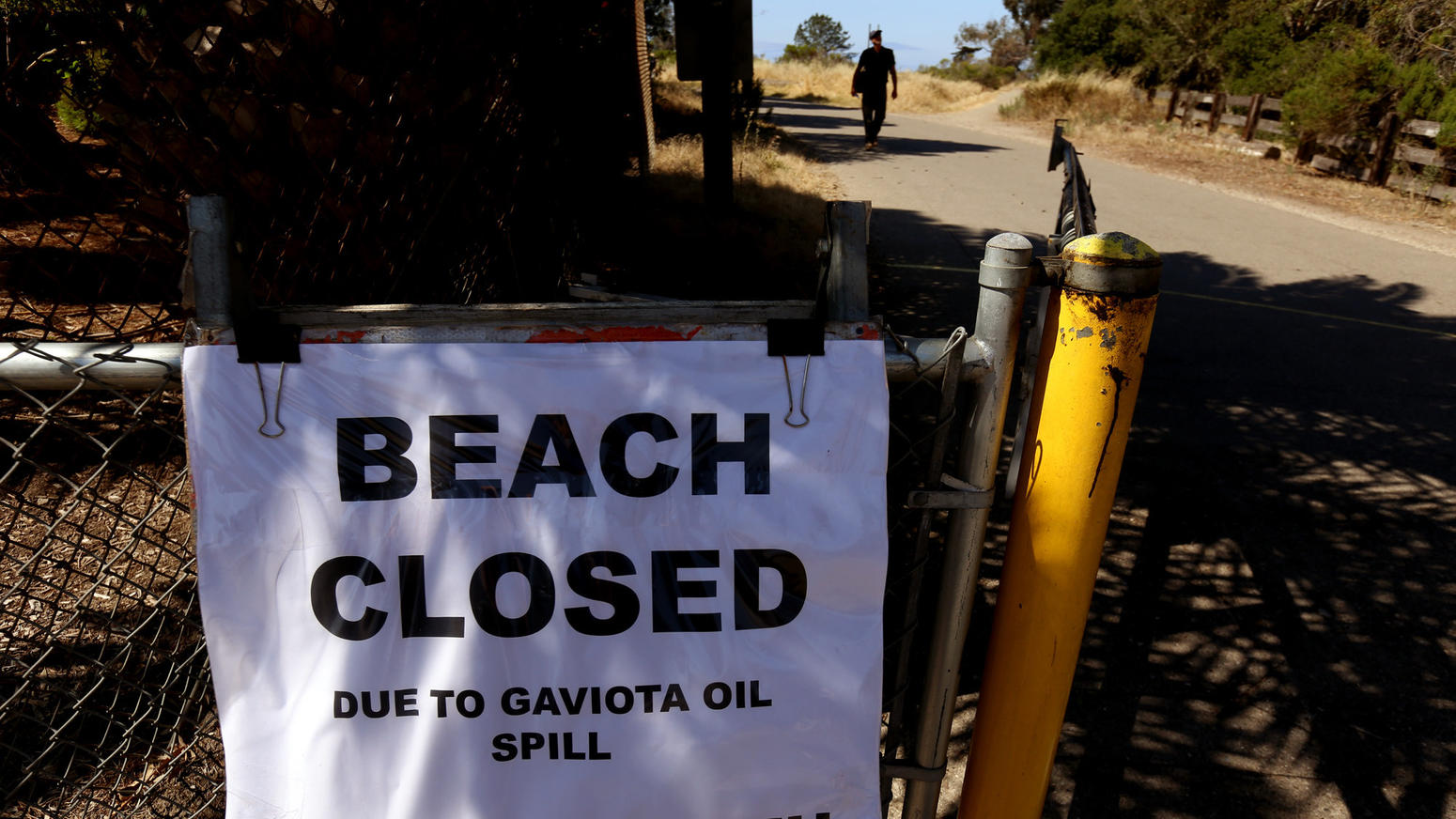
Oil spill on Santa Barbara County coast. A "Beach Closed" sign is posted at Coal Oil Point in Isla Vista. Many state beaches have been closed in the area, but some people still made their way to the shore: photo by Genaro Molina / Los Angeles Times, 23 May 2015
A great blue heron hides behind a rock on the beach at Coal Oil Point in Isla Vista. The beach was closed because of the oil spill.: photo by Genaro Molina / Los Angeles Times, 23 May 2015
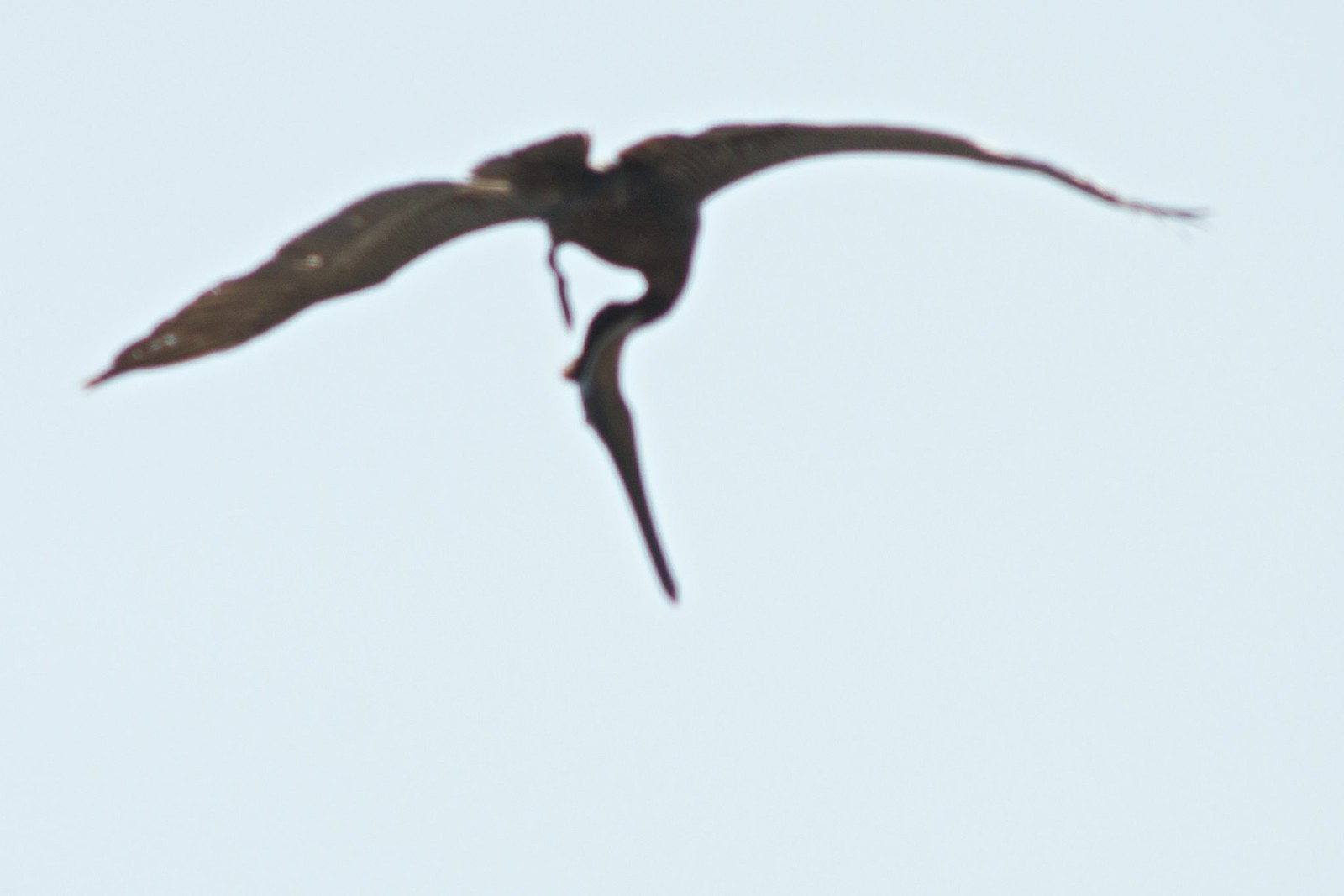
Brown Pelican in a dive, Goleta, California: photo by Jon Sullivan, 28 July 2013
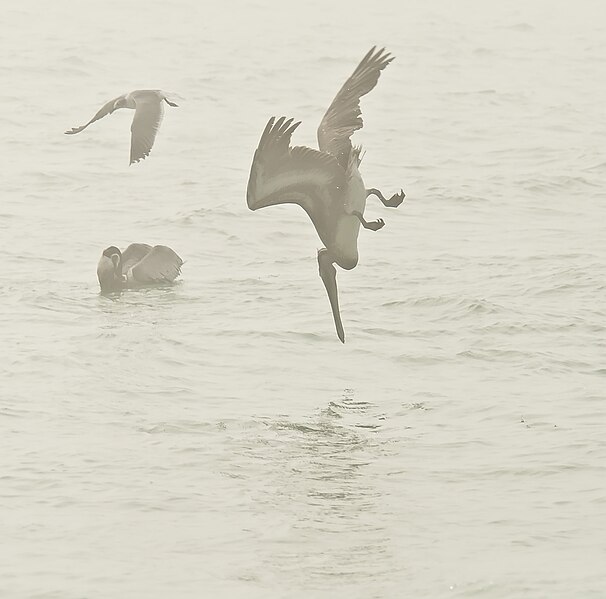
Brown Pelican in a dive: photo by Coveredinsevindust, 11 March 2014

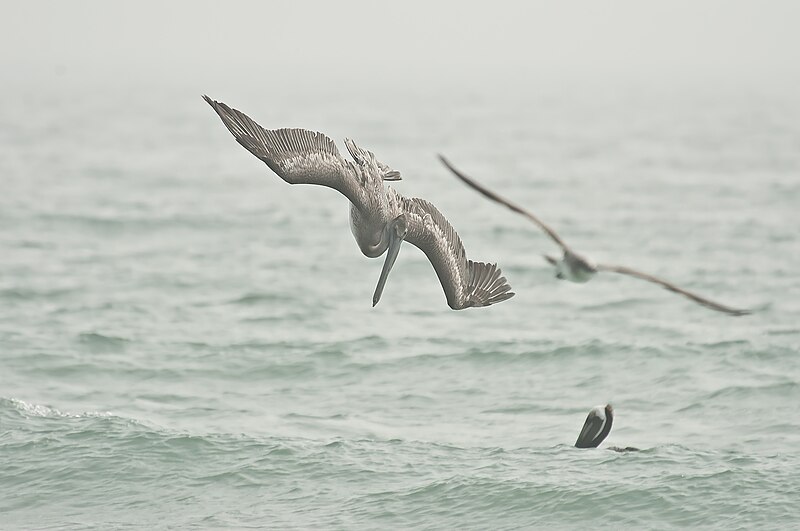



14 comments:
i read the poem, tom, and take in the first photographs of the birds, which can only be perceived as beautiful. and then i ready myself for i am at tom clark's and i know what is to come. and there it is as i scroll down, oil.
i keep coming, tom, and reading, but i have to admit, i have less and less to say these days. i am so sick with us. i am sick and speechless.
i think one has to be careful with the sickness and sadness of this world, or at least i have to be careful. i think of jack gilbert's poem, a brief for the defense.
you do difficult work here. important work. but for a moment (i can't help myself), i put my hand on your knee and we look out the window past the terrible oil slicks... there are birds flying. ))))
erin,
Thanks as always, and yes, I do know that poem --
from: Jack Gilbert: A Brief for the Defense
Sorrow everywhere. Slaughter everywhere. If babies
are not starving someplace, they are starving
somewhere else. With flies in their nostrils.
But we enjoy our lives because that's what God wants.
-- and, reading it again, continue to find it remarkable that someone might be so enamoured with himself as to suppose there exists such a thing as a "God" who has wishes and wants concerning some human individual, whose pleasure it is the job of this "God" to effectuate.
That's backward logic, and fatuous to boot..
Any "God" who would give paramount concern to the demand of humans to "enjoy their lives" at the expense of and/or without regard to the survival and continuance of all life on this small planet might equally be named many other things, some not so nice.
To "enjoy their lives" is the objective of every person whose "life style" includes the relentless and insatiable desire to keep using up and depleting the earth at any cost, until all other forms of life have been extinguished.
There is nothing in this world more profitable than exploiting and thus perpetuating that human desire by drilling and fracking and pipelining so that there will continue be cheap and abundant supplies of this buried "resource", which can hardly be seen as a source of light, and in fact comes far closer to resembling some terrible buried genie that once released can bring about nothing but death.
That too represents a kind of god, and perhaps it too "wants" something, maybe even for drivers on every freeway to "enjoy their lives".
But that is an expensive form of joy if it means killing off the magnificent organisms that preceded us on this planet, and to whom the life style and amusement of humans is perhaps not an important desideratum.
If on the other hand looking closely at the reality of the world turns out to be less enjoyable than maintaining a fantasy which places desiring human subjects at the center of the universe, because "that's what God wants", then I expect there will continue to be a grand and growing traffic in the God market.
I have rested at daybreak on that beach and seen those pelicans wheeling and dipping over those waters and it never crossed my mind to suppose some sort of god might want to make me happy by saturating their bodies with globs of crude oil.
Anyone who's spent extended time on that patch of coastline is familiar with the omnipresent odour of oil seeping from the ancient submarine rocks offshore, one can't help knowing it's there, the smell has the effect of reminding one that it's there, Big Oil has been champing at the bit to get at it for some time now, and the pipeline arrangement is merely an alternative to offshore rigs, which carry, as BP made plain to us, even greater potential for environmental harm.
Not forgetting that the oil companies, like all entitled entities and agencies, believe that their own satisfaction is what God wants.
I prefer Jeffers' poem to Gilbert's, if only for the word "omnisecular", which suggests that perhaps the most accurate picture of the grandeur and splendour and diversity of Nature might be one that left "God" out altogether.
What's maybe relevant here is something Jeffers wrote when questioned on the "God issue".
Not forgetting that he was the son of a Presbyterian minister who was also a professor of Old Testament textual studies and exegesis -- a reserved, reclusive man who tutored his son at home in Greek and Latin and Calvinist doctrine.
The poet's own religious beliefs were singular. In 1934, responding to a query on this subject from Sister Mary Powers, he wrote:
"I believe that the Universe is one being, all its parts are different expressions of the same energy, and they are all in communication with each other, therefore parts of one organic whole. (This is physics, I believe, as well as religion.) The parts change and pass, or die, people and races and rocks and stars, none of them seems to me important in itself, but only the whole. This whole is in all its parts so beautiful, and is felt by me to be so intensely in earnest, that I am compelled to love it and to think of it as divine. It seems to me that this whole alone is worthy of the deeper sort of love and there is peace, freedom, I might say a kind of salvation, in turning one's affections outward toward this one God, rather than inwards on one's self, or on humanity, or on human imaginations and abstractions -- the world of spirits.
"I think it is our privilege and felicity to love God for his beauty, without claiming or expecting love from him. We are not important to him, but he to us.
"I think that one may contribute (ever so slightly) to the beauty of things by making one's own life and environment beautiful, as far as one's power reaches.This includes moral beauty, one of the qualities of humanity, though it seems not to appear elsewhere in the universe. But I would have each person realize that his contribution is not important, its success not really a matter for exultation nor its failure for mourning; the beauty of things is sufficient without him.
"(An office of tragic poetry is to show that there is beauty in pain and failure as much as in success and happiness.)"
not quite "Nothing at all has suffered erasure." -- "A pelican covered in oil sits on a beach about a mile west of Refugio State Beach on Wednesday"
Steve, thanks for pointing to the sentence that recalled this poem to me. Though Jeffers understood wars and Zeppelins well enough, as also the creeping, menacing encroachment of "civilization" upon the Wild, it would be my guess that the thought that the majestic central Coast, and its wild inhabitants, might one day endure this kind of desecration, probably never occurred to him.
He trusted -- and assumed -- that there was a bedrock presence of rock and sea and sky which could, and would, outlast and withstand the worst lilliputian aggressions of his own kind. Ironically, as he was certainly no foolish optimist, that trust and that assumption are proving to have been optimistic.
How lovely it would be if we could be allowed the privilege and luxury of "enjoying our living", our recreation, our lifestyle, while steadfastly looking away from everything that had to die so that "the living" (humans) might conveniently enjoy these things!
Or to say this another way, here we are, having arrived at another of those enjoyment-packed national holidays, bleak and cold though it may be, and the traffic flow on the freeway feeder is correspondingly ceaseless and intense and take-no prisoners, much as during a routine weekday rush hour. I hazarded the rickety steps and was rewarded with a testing vision. Lying next to a parked car, there in the multi-lane traffic stream, was a large, beautiful, sheen-blue and jet-black crow, evidently a fresh victim of all that urgent enjoying of living.
Perhaps one notices these things only after lapsing from the fast lane forever, I don't know.
In any case, always swell to hear your words, and may your day be peaceful, and please remember me to the ridge, and the channels.
Dear Tom,
Thanks for this, one of those "large, beautiful, sheen- blue and jet-black" crows is even now standing on the edge of the bird bath, a piece of bread in its mouth (just cut up and put by me on table beside fence, followed by crows landing one by one on that table to snatch up those pieces, carry them away to wherever they go with them --- wish I could send a photo of one of them doing just that to you here . . .
Otherwise, the grasses in the field have grown tall and browner, northwest wind blowing them back and forth, now sunlit forest green ridge emerged from this morning's fog, one long last white cloud of it still hanging there in pale blue of sky above it -- maybe some glimmer of the "bedrock presence of rock and sea and sky" after all . . . ?
oh, i always believed gilbert brought god into that poem facetiously on our (society's) behalf, not because it was what he exalted.
i do know that jeffers' response about god, "I believe that the Universe is one being..." and i love and respect him for a life committed to truly living this philosophy. but we do part ways in that i believe the grandeur and splendour and diversity of Nature is in fact god, only i don't shrink from the word in any way, nor do i correlate it with christianity or religion. for me it is only a word, an emblem of what is truly great, and yes, which we continually desecrate through avarice and unrestrained ego.
Tom,
Thank you for the work you do here. I think it is important. That said ....
You ignore both what Erin actually says in her comment and what Gilbert's poem actually says so thoroughly that it is difficult to imagine the misreading is not intentional, a matter of using her comment as a stepping-off point into a private rant rather than attempting a true and relevant response.
There is nothing in “A Brief for the Defense” that suggests the suffering of others is not real or important (there is much to the contrary). There is nothing in Gilbert's poem that suggests one person's enjoyment is more important than the suffering of others, or more important than the massive “omnisecular” suffering wrought by environmental devastation. The poem says that suffering and joy exist side by side and both are meaningful (it doesn't even say they are equally meaningful, just that both exist and that we should work to ensure the continued existence of joy). Your suggestions that the poem's ethos would “give paramount concern to the demand of humans to 'enjoy their lives' at the expense of and/or without regard to the survival and continuance of all life on this small planet” and that Gilbert would therefore obviously endorse “the relentless and insatiable desire to keep using up and depleting the earth at any cost, until all other forms of life have been extinguished” are illogical and bizarrely arbitrary leaps that have nothing to do with the poem, as far as I can discern.
One thing Gilbert does do is make a distinction between “pleasure” and “delight” or “enjoyment,” a distinction that you ignore. It would not be difficult to make a case that the “expensive form of joy” to which you refer, and which you very rightly identify as “killing off the magnificent organisms that preceded us on the planet,” is not what Gilbert would call “joy,” but rather a reckless and destructive pursuit of “pleasure” that, in fact, ignores “joy” altogether. Certainly the body of Gilbert's work gives very little or no warrant in favor of the “life style” you are ranting against. In fact, it seems likely that Gilbert would agree with you in opposing the destruction of the natural world for empty human pleasures --- but, as noted, you ignore this distinction.
Why would it be essential to recognize and preserve joy (or “delight” or “enjoyment,” any of these terms, as distinct from mere “pleasure”) in the midst of the world's suffering? Or why might Erin be right to look past suffering, though not forgetting it or dismissing it as unimportant (she never says that), and also find joy in the flight of birds? A more directed question might be, what is the purpose of the rant or the struggle --- political, environmental, etc. --- if it doesn't recognize some vision of joy as a real and persistent goal to move toward? (And no, this is not anthropocentric arrogance. Jeffers's understanding of “the beauty of things” that transcends the human as “the Universe is one being, all its parts are different expressions of the same energy, and they are all in communication with each other, therefore parts of one organic whole” is an argument for inhuman joy. And besides, neither you nor Jeffers have a clue how pelicans or sea cliffs “feel” about their existence --- you both are really talking about your own joy in the Inhumanist vision. Inhumanism is a human idea --- we have no reason to believe it is endorsed by stars.)
“To make injustice the only
measure of our attention is to praise the Devil.”
If we put all of our attention into the recognition of injustice and noble struggle against it, leaving no room for the joy that should be the goal of the struggle, then what do we have? Perhaps a kind of misanthropy for its own sake that is, ultimately, just as much a self-centered indulgence as that of any oblivious driver on the freeway.
erin, I don't know about facetious, but I do know about b.s., and I do know that in mainstream poetry circles in America, "wonder" and "gladness" and "enjoyment" are the luminous signals of the inner excellence of the human, and that there can be no doubt that this sort of mainstream consumabiity is the thing that has made that poem, and the world view it represents, so very famous -- in America.
And indeed, I never thought Gilbert was being facetious in that poem, I thought he was saying exactly what he meant.
As famous as that passage at the beginning of his poem is, probably even more celebrated is the kicker:
We must risk delight. We can do without pleasure,
but not delight. Not enjoyment. We must have
the stubbornness to accept our gladness in the ruthless
furnace of this world.
Who are "we"? Jack means Jack, and maybe also whichever woman was figuring in his enjoyment at the time.
But do the human victims of genocide, or the animal victims of oil spills, get a chance to insist on their entitlement to "gladness" in this way?
The lines make the "ruthless furnace" seem hardly worse than a slightly too-warm hot tub.
In 1970, when I published a book called "Air", which was full of poems celebrating life and the world (for I was young, and had gone off to the edge of the continent on a shoestring, and was starting a family), my wife sent a copy to her mother, who had been through, of all things, the turmoil of Europe in the late 1930s, and lost family, friends, possessions, everything -- it was that "ruthless furnace", the real, unpoetic version. Her mother wrote back saying she found the book "beautiful, but a bit insouciant".
She was too right about the insouciance.
That book was as close as I ever came to writing the sort of poem that might give the impression that "enjoying our lives" is the reason for our existence here on earth. It was published by the sort of large New York company that Jack Gilbert always published with. The "message", like Jack's trademark "message", was "positive".
Since then I've learned a bit more about life and the world.
To my way of reading, that Jack Gilbert poem is the perfect stuff for happy-face calendars and greeting cards.
James,
Thanks, and as you and erin seem to be mounting a sort of tag-team defense of Jack Gilbert's poem, I suppose everything I've just said to erin would apply equally in responding to your comment.
Everyone has their own life complications, no one gets through life without a passel of trouble...
But as to this --
"The poem says that suffering and joy exist side by side and both are meaningful."
-- I'd simply ask you to think back to any time or times you may have spent suffering in the company of other sufferers.
Ever spent a night lying conscious with a broken neck on a gurney after emergency head surgery in the trauma unit of a big city hospital, surrounded by a ward-full of other gurney-bound sufferers, none of them white, all nonetheless human, all much younger than yourself yet suffering all the same, from gunshot, stabbing or overdose, all moaning or weeping or crying out?
The medical personnel on duty in such places might try to respond to your suffering by informing you that, after all, suffering and joy exist side by side.
They might, if they were fools. But the company of sufferers suffers fools ungladly.
The actual front-line response, which goes on all through the weeping, moaning, livelong night, is "shut up!" -- and if that fails to quiet the sufferer, a couple of Vikes, followed by, "shut up!"
One hears the stressed out ER personnel talking among themselves, sharing their therapeutic wisdom.
"I told her to shut up, she didn't, I just gave her two Vikes, she'll shut up now."
Tom, I don't know much about poetry and maybe I'm missing something here but
'To hear the faint sound of oars in the silence as a rowboat
comes slowly out and then goes back is truly worth
all the years of sorrow that are to come.'
sounds like utter bullshit!
Thanks, K.
The sheer quantity of unknowing that has attended upon this post is growing truly impressive.
The punishment, it seems, for demoting one's true subject to the nether regions of the post, out of a craven desire to sugar the pill of truth -- the truth that offshore deepwater oil drilling, which was made illegal by California after the terrible 1969 Santa Barbara spill, though Exxon, which had an old stake in this dangerous game, and was thus "grandfathered" into a "right" to continue drilling and pumping, leading, over time, to this latest spill -- is dangerous to all life.
At the bottom of the Gulf of Mexico there remain three million gallons of oil, about half of which constitute the extremely toxic residue deposited by the "snot-trail" that remains after the "oil-eating bacteria" helpfully distributed upon the waters by BP in the wake of their staggering deepwater-drilling malfeasance managed to eat the "lighter" parts of the crude oil then spilled, leaving the several dozen most lethal chemical compounds to be excreted to drift upon the ocean floor, creating a massive dead-zone, a threat to all life for the next thousand years or so -- a rather grave object lesson, were there anybody conscious enough to learn from it.
This weekend just now past was one of America's official recreational extended holidays. There are eight of those. Gas up and go! Don't mind the consequences!
People find it unpleasant to think about those consequences, which is of course convenient for Big Oil; in addition to having all the political clout that can be bought when you have the most money, the oil companies enjoy the tacit permission of a colluding populace so intent on "enjoying its living" (that is, jumping in the car on the slightest impulse) that it is blind to, and indeed averse to, hearing a word said about the consequences.
Robinson Jeffers, "Going to Horse Flats"
https://books.google.ca/books?id=MTn_okYQeW0C&pg=PA541&lpg=PA541&dq=Jeffers+%22Going+to+Horse+Flats%22&source=bl&ots=TMufY4jVX9&sig=2iEVLGvVGmKJaXCExWyy6sAZbnE&hl=en&sa=X&ei=zopoVayXH5P-yQSflIOoCA&ved=0CC8Q6AEwAQ#v=onepage&q=Jeffers%20%22Going%20to%20Horse%20Flats%22&f=false
Er, thanks once more, James.
That particular Jeffers poem, Horse Flats -- bald, didactic, confused, confusing, dialogic yet not really -- has always eluded me. Obviously the rise of Nazism and the war in Spain were on his mind, as on many people's minds, and there were no answers to be found to the inchoate questions buried in yet never articulated in what is finally an all too prosaic attempt at semi-topical verse. The dramatic situation in the work is at best quite muddled. It's staged as an exchange but isn't one. There are some who think of it as a comic poem. Dunno about that. Maybe I'm just too old to get the joke.
But I suppose you too must have a didactic intent in recommending one of the poet's least accomplished works.
Just a guess.
Mystery guests, confused and confusing silences, guesses, stabs in the dark, turned backs, distant bafflements, trollikenesses, strange messages that mysteriously don't arrive in inbox, unhighlighted links, altogether confounding.
Bottom line, this post was hijacked by the banality of Jack Gilbert, and it may thus be only fitting that it should now be buried by hanging it at half-mast on the yardarm of Jeffers' own mixed up preachifying. Yegads.
Post a Comment